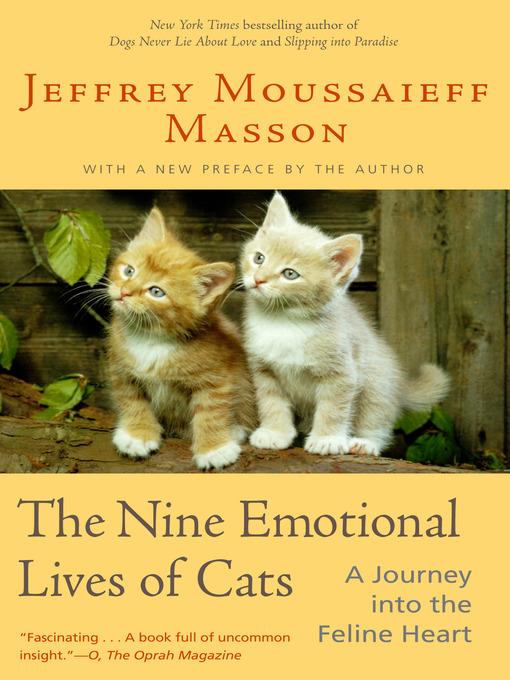
The Nine Emotional Lives of Cats
A Journey Into the Feline Heart
کتاب های مرتبط
- اطلاعات
- نقد و بررسی
- دیدگاه کاربران
نقد و بررسی

July 15, 2002
Prevailing wisdom holds that cats are aloof, smug, quintessentially distant—especially when compared to dogs—but Masson, in his latest exploration of feelings in the animal world, argues otherwise: "cats," he says, "are almost pure emotion." He establishes nine basics (narcissism, love, contentment, attachment, jealousy, fear, anger, curiosity and playfulness) and, in nine casual and sometimes digressive chapters, suggests when and why cats feel each of them and how we humans might better understand our pets as a result. In the tradition of his bestselling Dogs Never Lie About Love, Masson's exploration is a warm fuzzy to the feline world: in observing the antics of his five cats (Miki, Moko, Yossie, Megalamandira and Minnalouche), Masson's tone never fails to convey his wonder for "these perfect beings who briefly and softly grace my life." He draws desultorily on history, scientific research and correspondence with cat experts and owners, but most of his book is dedicated to a highly subjective study of his beloved five, who live with him in a New Zealand paradise. Though Masson strains to establish evidence for cats' sophisticated emotional landscape (and in doing so exposes himself to accusations of anthropomorphism), cats are still mysterious creatures, and even a former psychoanalyst such as he must occasionally admit (though with a certain kind of glee) that he cannot entirely figure them out. One thing Masson is sure of: because cats, unlike humans and dogs, have never been pack animals, much of what comes naturally to us—guilt, apology, even rage—is absent in cats. In the end, this appealing book is as much a portrait of Masson as it is of his enchanting cats.

Starred review from September 15, 2002
Masson, a former Sanskrit scholar and psychoanalyst, is no stranger to the concept of animal emotions or to the best sellers lists. Now he does for the house cat what he did for dogs in Dogs Never Lie About Love, exploring the range of feline emotions and the relationships that take place between cats and humans. What makes his works unique is that he doesn't try to give definitive scientific accounts of animal behavior, complete with definitions and cause/effect; nor does he just recount personal anecdotes. Instead, he takes anecdotal experiences and translates them into enlightened observations that shatter the myths that cats are aloof, independent, and egocentric. In a style similar to that of Elizabeth Marshall Thomas's The Tribe of Tiger, he addresses in each chapter a particular feline emotion (narcissism, love, contentment, attachment, jealousy, fear, anger, curiosity, and playfulness), using the comings and goings of his five cats as examples. Although his argument that dogs and cats should be left to wander the streets and fields at will is a very controversial one, it will not deter people from reading, enjoying, and learning from this book. This should be very popular with cat lovers everywhere, especially those who want something more than a personal account but less than a behavioral treatise. Highly recommended. [Previewed in Prepub Alert, LJ 7/02.]-Edell M. Schaefer, Brookfield P.L., WI

April 1, 2003
Adult/High School-"Too many people tend to see cats as uncomplicated creatures with few emotions- I am convinced that, on the contrary, cats are almost pure emotion," asserts Masson, a psychoanalyst. In nine chapters, he examines how cats might really be experiencing what we see as "Narcissism," "Love," "Contentment," "Attachment," "Jealousy," "Fear," "Anger," "Curiosity," and "Playfulness." However, although he refers to other experts and includes an excellent bibliography, all this seems more like memoir than science because the author is mostly relating, in a conversational style, his family's experiences with five young cats in their home in New Zealand. Accompanying Masson on daily walks on the beach, having mysterious adventures in the rain forest, or interacting in surprising ways with rambunctious children, the felines are a rich source of fascination, information, and insight. Given the small number of subjects and the short period of observation, Masson arrives at some conclusions and generalizations that many readers are bound to question or disagree with, but the spirit of inquiry is part of the charm of this book. Anyone intrigued by psychology or animal studies should enjoy this title and be inspired to look more closely at the creatures around them.-Christine C. Menefee, Fairfax County Public Library, VA
Copyright 2003 School Library Journal, LLC Used with permission.

September 1, 2002
Anyone who lives with five cats will understand--or, at least, is familiar with--the mysterious and playful world felines inhabit. Masson's credentials are impeccable, since he's examined animals in all shapes and sizes (in " When Elephants Weep," 1994, and " Dogs Never Lie about Love," 1997). The nine emotions he mentions in the title are based on both scholarly research and observation as well as no small amount on philosophical musings. Witness, for example, the chapter on narcissism, which concludes "Not so much egocentric as self-involved, cats have depended for centuries on themselves, not on the pack as dogs do." He tells tales, including one about the four cats that jog with him on a New Zealand beach, and about the fear more prevalent in older cats. Worth reading and reading again, accompanied by a purring lap cat.(Reprinted with permission of Booklist, copyright 2002, American Library Association.)

























دیدگاه کاربران